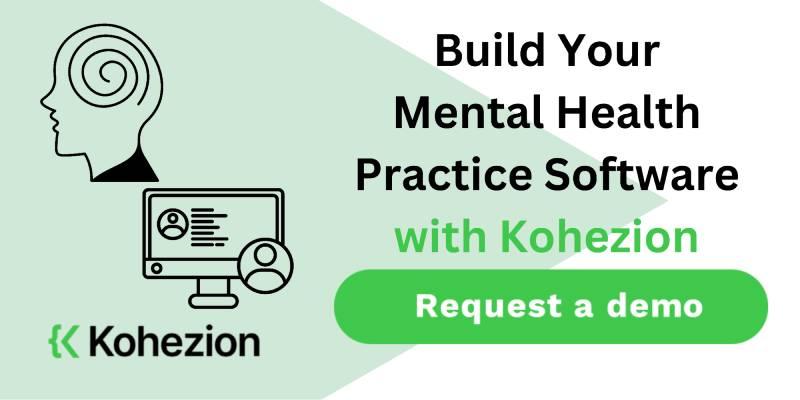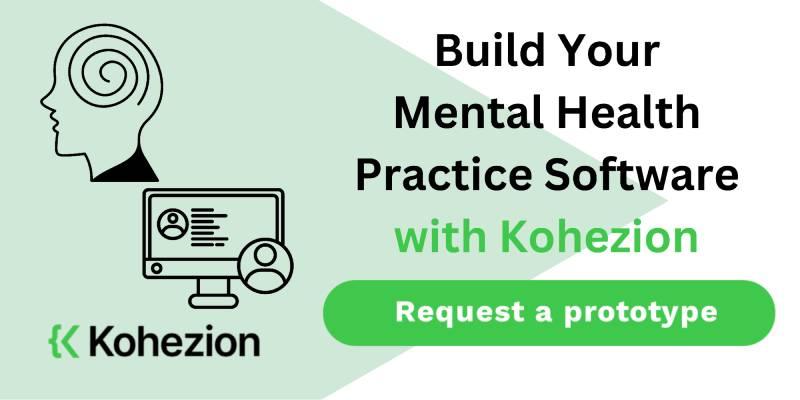In 2021, about 14.1 million adults in the U.S. had serious mental illness, making up 5.5% of all people over 18 in the country. The need for good mental health software is growing fast. Now, more than ever, practitioners are using new tech to help their clients and make work easier.
In this article, we'll show you the top mental health tools for 2024. You'll see how advanced software can change your practice for the better. It helps with keeping records, making treatment plans, and more. This tech is making patient care and work processes better than ever.
What is Mental Health Practice Software
Mental health practice software is designed for mental health professionals. It helps streamline tasks, increase productivity, and improve patient care. It includes tools like Electronic Health Records (EHR), practice management systems, and telehealth apps, all tailored for behavioral health.
There are different types of mental health software. EHR systems help manage patient records and ensure compliance. Practice management software makes scheduling and billing easier. Telehealth apps allow for virtual consultations, making care more accessible.
Using these tools together helps mental health care work better. It lets you track treatment progress well. Using different software can improve your workflow, engage patients more, and achieve better results.
Why is Mental Health Practice Software Important
Mental health software is a must for mental health professionals who are under a lot of pressure. It helps them focus more on their patients, improving their care.
Using software tools brings many benefits. It helps you connect better with your patients, leading to stronger relationships. It also makes managing patient data easier, helping you make better treatment plans.
Technology makes mental health services more efficient. As more people seek help, having effective care is more important than ever. The software helps make sure patients get the best care possible, improving their health outcomes.
Benefits of Mental Health Practice Software
Mental health practice software has many benefits. It improves patient care and makes administrative tasks easier. This technology helps streamline processes, engage patients, and keep data safe. It all adds up to better service in mental health practices.
Improved Patient Engagement
Using patient engagement tools helps patients take charge of their care. Online portals let them see their plans, track progress, and talk to providers, leading to better treatment adherence and happier patients.
Improved Data Security
Keeping patient data safe is crucial. Mental health software uses top-notch encryption and strict security rules. This keeps patient info private and meets HIPAA standards, building trust in your practice.
Streamlined Appointment Scheduling
Automation in scheduling cuts down on missed appointments and improves workflow. Features like reminders and easy booking systems help keep things running smoothly, improving the patient experience.
Efficient Record Keeping
Automated record-keeping reduces mistakes, ensures up-to-date patient histories, and makes them easy to find. This allows you to focus more on care, not paperwork.
Personalized Treatment Plans
Mental health software lets you create plans that fit each patient's needs. This personal touch makes patients feel heard and understood, increasing engagement.
Better Communication Channels
Good communication is key. Mental health software offers special messaging channels, which keep everyone involved in the treatment process informed.
Comprehensive Progress Tracking
Integrated systems track patient progress over time. This detailed tracking lets you adjust treatment plans as needed, making care more effective.
Increased Accessibility to Resources
Patient portals make important mental health resources more accessible. This means patients can get help and information whenever they need it, helping them be more independent in their care.
Improved Administrative Efficiency
Mental health practice software automates routine tasks, freeing staff to focus on patient care and leading to better care delivery.

Alt text: Benefits of Mental Health Practice Software
Top 10 Mental Health Practice Software Tools
Here are the top 10 mental health practice software tools that can help improve your practice’s efficiency and patient care.
1. Kohezion
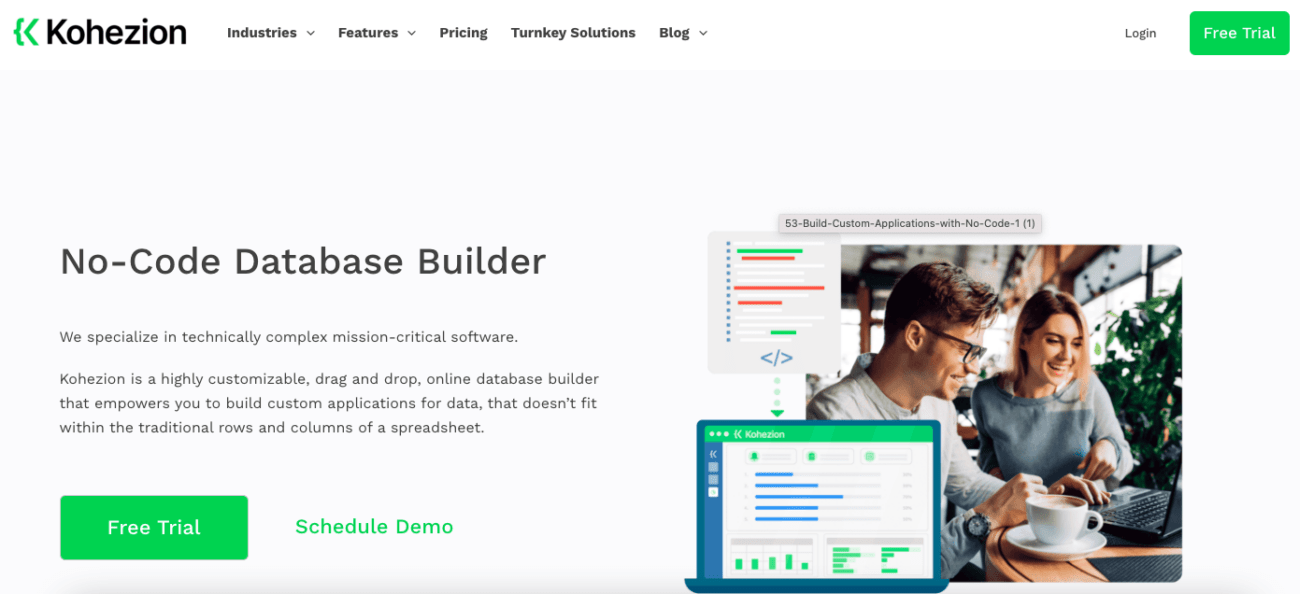
Kohezion is a customizable mental health practice management solution designed to streamline data management and improve clinic operations. It offers a flexible platform for creating tailored workflows, making tracking patient records and managing appointments easy. Its robust security features ensure that sensitive mental health data is protected.
Top 5 Features
- Customizable workflows to suit specific practice needs
- Secure patient record management with HIPAA compliance
- Appointment scheduling with integrated reminders
- Real-time data tracking and analytics for performance
- Multi-user collaboration with role-based permissions
5 Benefits
- Improves practice efficiency with customizable workflows
- Improves patient data security with strong compliance measures
- Facilitates smoother scheduling and appointment management
- Offers detailed insights with real-time analytics
- Supports team collaboration with user-specific access
2 Cons
- May require training to fully utilize customization options
- Lacks specialized telehealth features
Best For
Mental health practices needing flexible, customizable management software.
2. TheraNest
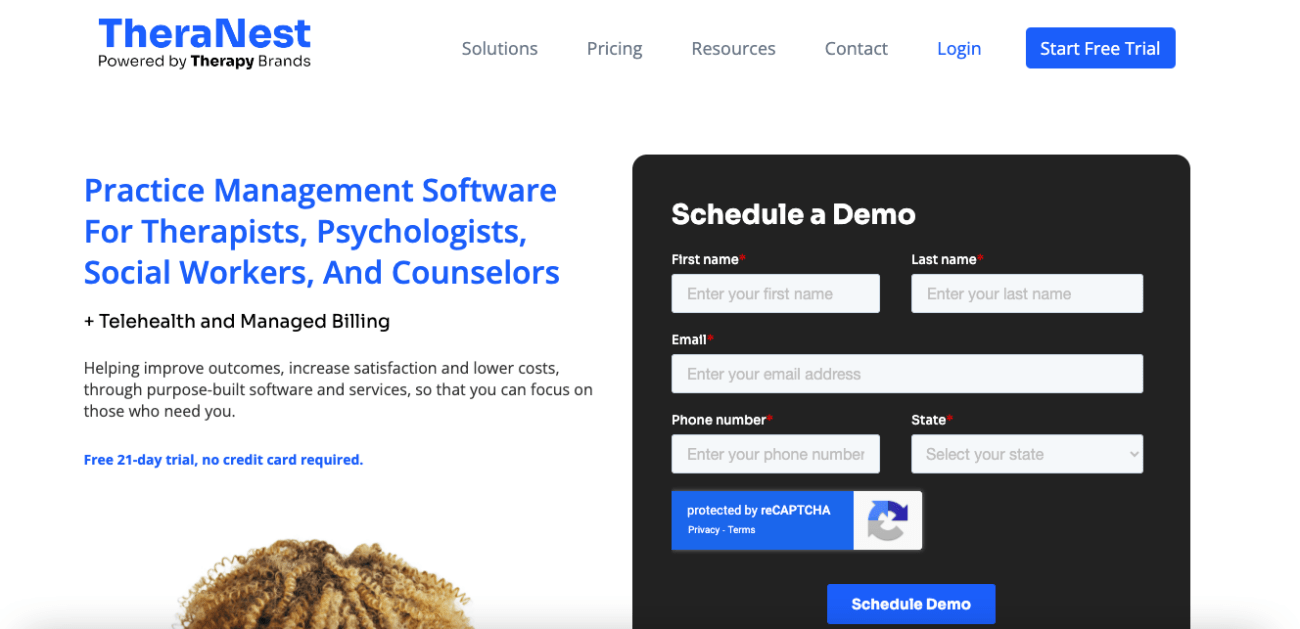
TheraNest is a comprehensive mental health practice management software designed to help therapists, counselors, and social workers streamline their workflows. It offers tools for scheduling, billing, telehealth, and note-taking, making it easier for practices to manage both administrative tasks and client care. TheraNest is widely used for individual and group therapy practices, providing an all-in-one solution for mental health professionals.
Top 5 Features
- Easy-to-use scheduling with calendar sync
- Telehealth for secure video sessions
- Integrated billing with insurance claim submissions
- Customizable progress notes and treatment plans
- Client portal for secure communication and document sharing
5 Benefits
- Simplifies day-to-day practice management
- Helps reduce missed appointments with automated reminders
- Offers telehealth options for remote care
- Improves billing efficiency with claim tracking
- Provides secure communication between clients and therapists
2 Cons
- Learning curve for new users
- Limited customization options for certain forms
Best For
Best for small to medium-sized practices needing a comprehensive solution for managing client care and administrative tasks.
3. CounSol.com
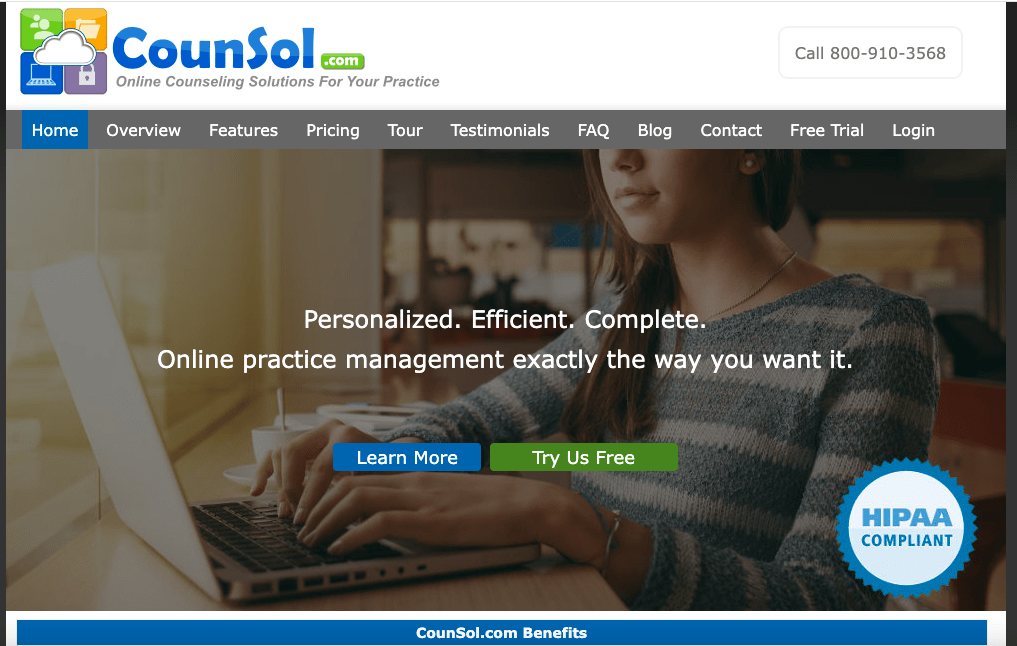
CounSol.com is a versatile practice management software tailored for mental health professionals. It offers features for client scheduling, secure communication, billing, and documentation. Designed to streamline administrative tasks, it helps therapists manage their practice more efficiently while focusing on providing quality care.
Top 5 Features
- Online scheduling with client self-service options
- Secure messaging and document sharing
- Integrated billing and insurance claim management
- Customizable treatment plans and progress notes
- Telehealth capabilities for virtual sessions
5 Benefits
- Simplifies appointment scheduling with online booking
- Enhances client communication through secure messaging
- Streamlines billing with integrated insurance management
- Allows for customized documentation and treatment planning
- Supports remote care with telehealth functionality
2 Cons
- Interface may be less intuitive for some users
- Limited integrations with other third-party tools
Best For
Best for mental health practices needing a comprehensive management tool with robust scheduling and billing features.
4. Tebra
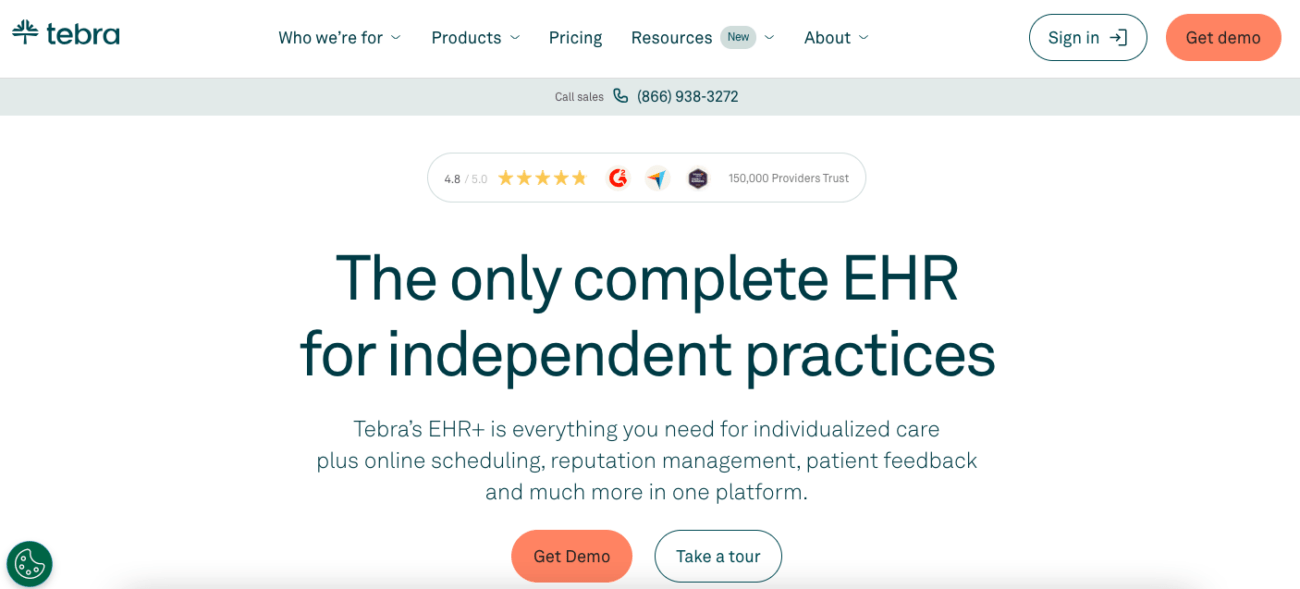
Tebra is an all-in-one platform that combines practice management and patient engagement tools for mental health professionals. It offers seamless appointment scheduling, billing, and telehealth capabilities to improve the client experience and operational efficiency.
Top 5 Features
- Comprehensive patient engagement tools
- Telehealth functionality for remote sessions
- Billing and payment processing integration
- Appointment scheduling with automated reminders
- Secure client data management with HIPAA compliance
5 Benefits
- Improves client engagement with easy communication tools
- Supports remote therapy sessions with telehealth
- Simplifies billing with integrated payment processing
- Reduces missed appointments with automated reminders
- Ensures data security with HIPAA compliance
2 Cons
- Learning curve for new users due to feature complexity
- Higher cost compared to basic scheduling platforms
Best For
Mental health practices that need an all-in-one solution for management and client engagement.
5. Therapist Aid
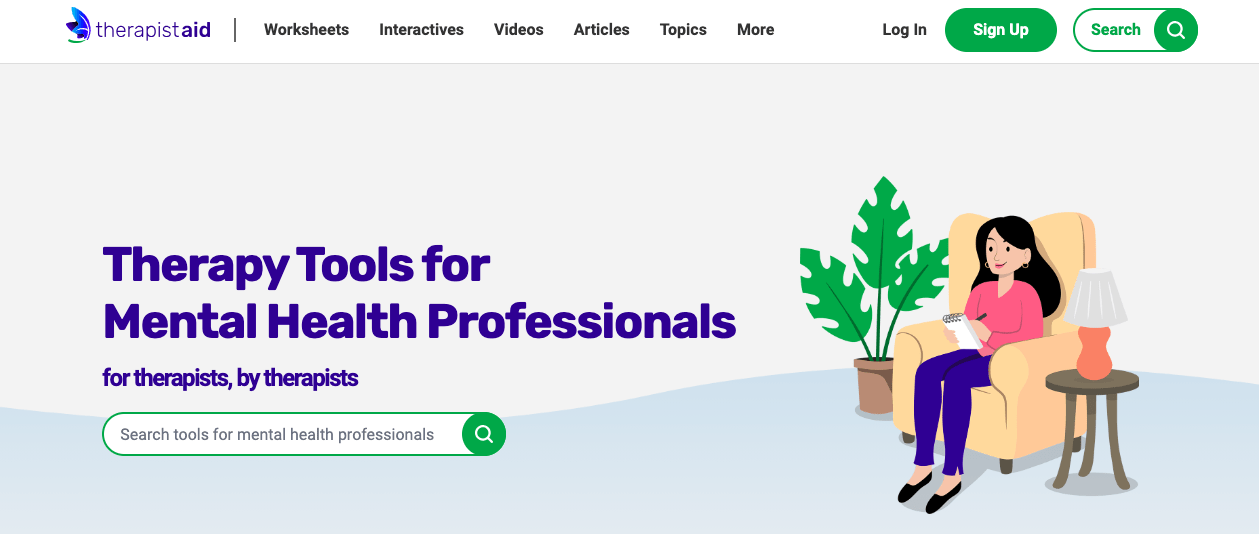
Therapist Aid is a practical software solution designed to support mental health professionals with tools for managing therapy sessions, client records, and treatment plans. It offers a range of resources, including worksheets and treatment guides, to enhance client care and improve therapy outcomes. Its user-friendly design makes it a great choice for therapists seeking to streamline their practice.
Top 5 Features
- Access to a library of therapy worksheets and tools
- Client record management with session notes
- Customizable treatment plans and progress tracking
- Secure client communication and document sharing
- Integration with various practice management tools
5 Benefits
- Provides ready-to-use therapy resources and worksheets
- Simplifies record-keeping with organized session notes
- Enhances treatment planning with customizable templates
- Ensures secure communication and data protection
- Integrates with other tools for a seamless workflow
2 Cons
- May lack advanced billing and scheduling features
- Limited telehealth capabilities
Best For
Best for mental health professionals seeking an easy-to-use tool for managing therapy sessions and client records with additional resources for treatment.
6. SimplePractice
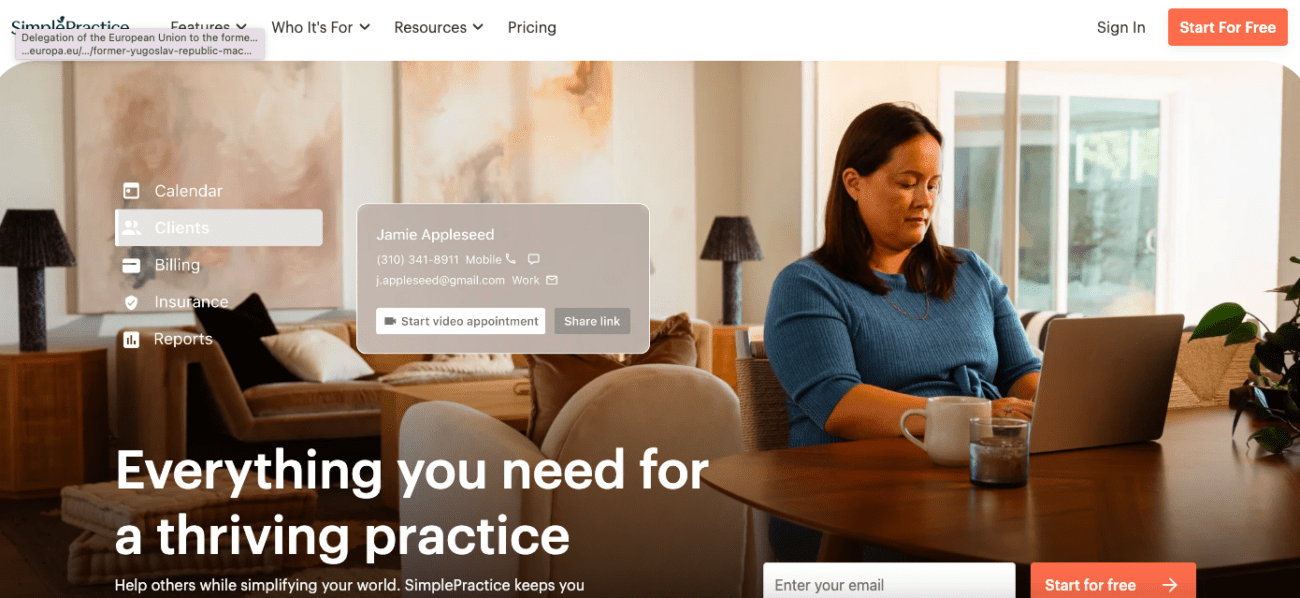
SimplePractice is a comprehensive practice management solution designed for mental health professionals. It offers features such as appointment scheduling, billing, and telehealth, helping practices streamline their day-to-day operations.
Top 5 Features
- Integrated telehealth platform for virtual sessions
- Automated billing and claims processing
- Client portal for easy appointment booking
- HIPAA-compliant secure messaging system
- Customizable intake forms and templates
5 Benefits
- Improves practice efficiency with automated billing
- Improves client communication with a secure portal
- Facilitates virtual care with telehealth
- Streamlines documentation with customizable forms
- Offers seamless claims processing
2 Cons
- Limited customization for large practices
- Higher price point for premium features
Best For
Mental health practices needing an all-in-one management solution with telehealth capabilities.
7. OnCall Health

OnCall Health is a telehealth-focused practice management platform designed to streamline virtual care for mental health professionals. It offers secure video consultations, client management, and billing, helping practices deliver remote care effectively.
Top 5 Features
- Secure video conferencing for telehealth
- HIPAA-compliant client data management
- Integrated billing and invoicing features
- Customizable appointment scheduling
- Patient messaging and follow-up tools
5 Benefits
- Facilitates remote care with secure telehealth options
- Improves client communication with follow-up tools
- Simplifies billing with integrated invoicing
- Protects client data with HIPAA compliance
- Streamlines appointment management
2 Cons
- Limited in-person appointment management features
- Dependence on internet connectivity for video quality
Best For
Mental health practices focused on delivering telehealth services.
8. Therap Services

Therap Services is a mental health practice management system designed for providers working with developmental disabilities. It offers case management, documentation, and billing tools to help streamline complex workflows.
Top 5 Features
- Case management and documentation tools
- Individual support plan management
- HIPAA-compliant data storage
- Integrated billing and claims processing
- Customizable reporting features
5 Benefits
- Simplifies case management with integrated tools
- Ensures data security with HIPAA compliance
- Improves workflow efficiency with automated documentation
- Facilitates billing with claims integration
- Supports detailed reporting for better insights
2 Cons
- Focused on developmental disability care, limiting broader use
- May have a steeper learning curve for new users
Best For
Practices specializing in developmental disabilities and mental health care.
9. Greenspace Health

Greenspace Health provides a platform for mental health practices to measure and improve patient outcomes. It offers tools to track client progress and integrates with various practice management systems to improve care delivery.
Top 5 Features
- Client progress tracking and measurement
- Integration with other practice management tools
- HIPAA-compliant data security
- Customizable assessments for client outcomes
- Reporting tools for client progress
5 Benefits
- Improves client care with progress tracking
- Improves outcomes with detailed assessments
- Supports integration with existing practice tools
- Ensures data privacy with HIPAA compliance
- Provides actionable insights with reporting features
2 Cons
- Focused primarily on outcome measurement
- Limited in terms of scheduling and billing features
Best For
Mental health practices focused on improving patient outcomes with data tracking.
10. CareLogic by Qualifacts
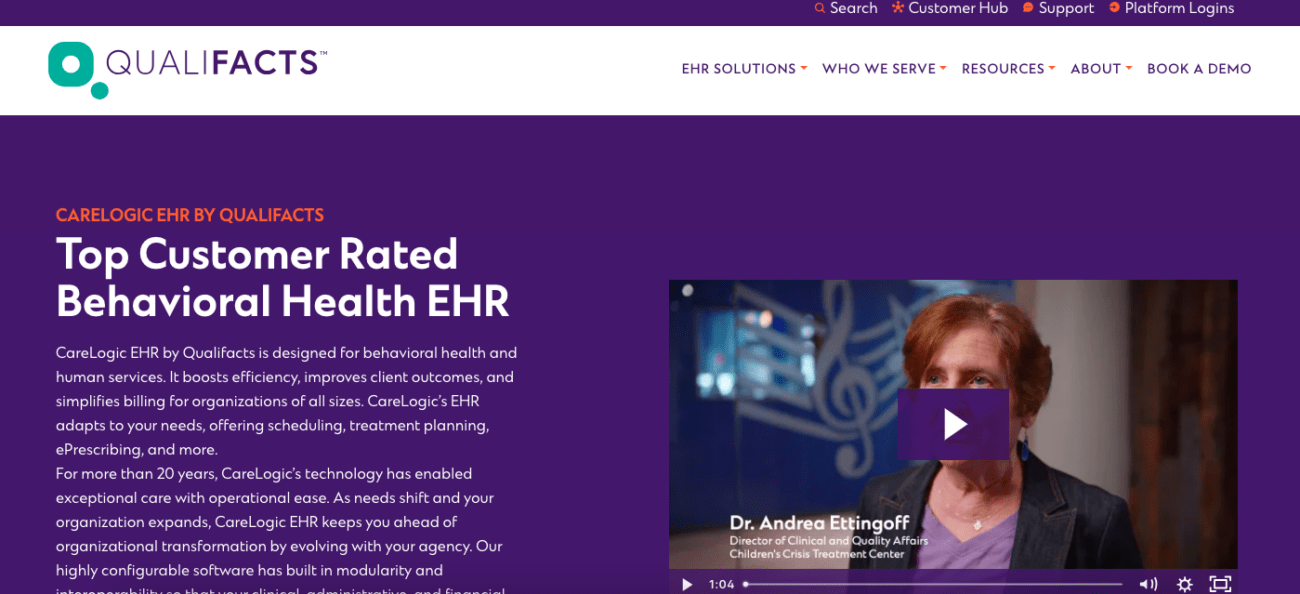
CareLogic by Qualifacts is an EHR system for mental and behavioral health providers. It offers comprehensive tools for client management, billing, and compliance, making it ideal for larger practices with complex needs.
Top 5 Features
- Full EHR system with client management
- Integrated billing and claims processing
- Compliance management with industry standards
- Customizable forms and templates
- Real-time data reporting and analytics
5 Benefits
- Streamlines client management with comprehensive EHR tools
- Improves billing efficiency with claims integration
- Ensures compliance with industry regulations
- Provides flexibility with customizable forms
- Improves decision-making with data-driven insights
2 Cons
- Higher cost, suitable for larger practices
- Complexity may require significant onboarding
Best For
Large mental health practices needing a full-featured EHR system with robust compliance features.
Top Features in Mental Health Practice Software
Mental health practice software has many features to help you improve your work. It has easy-to-use interfaces and key functions, and these tools are made to meet your needs well.
Appointment Coordination
This feature makes scheduling easier and reduces conflicts. It helps keep the patient flow smooth and can help you manage your day better.
Patient Access Portal
A patient access portal clarifies things. Patients can see their appointments and treatment information, which builds trust and helps them become involved in their care.
Medical Charting
Medical charting tools are easy to use. They make recording patient info faster and more accurate. You get detailed records quickly, saving time.
Appointment Confirmations and Reminders
Automated reminders and confirmations reduce paperwork, meaning more patients show up, saving time and effort.
Electronic Prescribing
Electronic prescribing reduces mistakes. It lets you send safe prescriptions to pharmacies directly, keeping patients safe.
Insurance Claims Management
Insurance claims management makes getting paid easier. It streamlines the process. This helps your practice's finances and saves time.
Healthcare Billing
Healthcare billing systems automate payment tracking, which improves your practice's cash flow and is vital for keeping it going.
Telemedicine Services
Telemedicine services meet the need for remote care. They let you keep providing services, and patients can get care from home, expanding your reach.

Mental Health Practice Software Pricing
Mental health software prices differ based on the software's capabilities. There are various software subscription models.
Many offer monthly or yearly plans to fit your budget. There are also tiered pricing options for practices of all sizes. This way, everyone can find a package that suits them.
Don't just look at the base cost. Consider add-ons like training and setup, too. These costs add up but can be worth it in the long run. Knowing all the costs helps you choose good software for your practice and wallet.
Kohezion: Mental Health Practice Software for Solo, Group, and Enterprise Providers
Kohezion is a flexible tool for mental health practices. It works well for solo practitioners, groups, or big enterprises. You can tailor its features to meet your specific needs.
The software's interface is easy to use, making it simple to manage appointments and track patient progress. It also helps improve workflow and relationships with clients.
It offers powerful charting tools. These tools give you a detailed look at your clients' histories and treatment plans, which is key for effective care.
Kohezion also has billing integration. This makes your financial tasks smoother. You can handle everything in one place. It also helps you stay compliant with industry standards.
Kohezion helps you focus on your clients, manage your practice well, and provide top-notch care and support.
Conclusion
Mental health practice software makes operations smoother and patient care better. The benefits include better communication, secure data, and care tailored to each patient.
The right software should match your practice's needs and help you serve patients well. The tools mentioned in this article show how technology can help treat and manage mental health.
Using strong software solutions ensures your practice meets patient needs. This approach helps you provide top-notch care and support mental health recovery.
If you're ready to improve your mental health practice with the right tools, contact Kohezion today to learn more about how our software can support your needs.
Start building with a free account
Frequently Asked Questions
Transitioning from paper records to software can seem overwhelming, but most mental health practice software platforms offer support during the process. Many systems provide data migration services and training to help practices smoothly move their records online. Once the transition is complete, managing client records becomes much easier and more organized, improving the efficiency of your practice.
When choosing mental health practice software, consider factors like ease of use, pricing, and specific features your practice needs, such as telehealth, billing, or scheduling. It's also important to check if the software is HIPAA-compliant to ensure client data is secure. Look for customer support options to help with any issues that may come up during daily use.
Absolutely. Many mental health practice software solutions are designed to be flexible and scalable, making them suitable for solo practitioners. These platforms offer features like scheduling, billing, and note-taking that streamline day-to-day tasks, allowing solo therapists to manage their practice efficiently without the need for extra staff.
Mental health practice software provides tools to track client progress and manage treatment plans. Some platforms offer outcome measurement features that help therapists monitor improvements over time. With better organization of client information and automated reminders, therapists can focus more on personalized care, leading to better results for clients.
